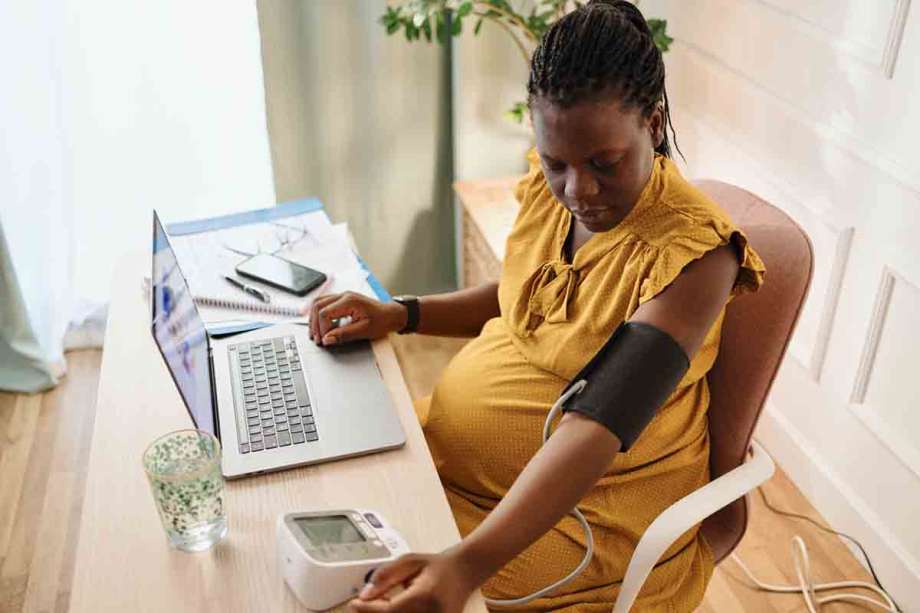Pregnancy Circulation Problems: Your Guide to Poor Circulation in Pregnancy

During pregnancy, the body goes through many changes to support the growth and development of the fetus.
These changes can sometimes affect the circulatory system, which moves blood and lymph fluid through the body, leading to poor circulation. Experiencing circulation issues in pregnancy can lead to a range of complications such as varicose veins, deep vein thrombosis, and leg cramps.
According to the American Heart Association, one of the biggest changes is the approximately 45% increase in blood volume during pregnancy which begins in the first trimester of pregnancy, peaks during the second trimester with the growth of the placenta, and returns to normal by two weeks postpartum.
Understanding the causes, risks, and treatment options for circulation problems in pregnancy can help to ensure the well-being of the mother and baby. If you’re worried about circulation problems in pregnancy, understand how you can help reduce painful pregnancy symptoms and prevent circulation issues or risks in the future.
Related: Risks of Multiple Pregnancy: High Blood Pressure
What are the symptoms of circulation problems?
Some of the symptoms of poor circulation are also common symptoms of normal pregnancy even without circulation problems, so it’s important to know what’s normal versus when you need to be evaluated.
If you are having persistent severe symptoms, it’s important to talk to your healthcare provider about what you are experiencing since these symptoms can sometimes be signs of higher-risk problems.
The most common symptoms of poor circulation during pregnancy are:
- lower leg swelling
- leg cramps
- numbness/tingling in the hands and feet
- cold hands and feet
- fatigue
- dizziness
Does pregnancy cause poor circulation?
For some pregnant women, poor circulation is part of the pregnancy experience that typically resolves within two weeks after delivery. The growing uterus causes pressure on blood vessels, especially in the pelvis and legs, causing poor circulation of blood and lymph fluid in the lower body.
Hormonal changes, such as increased progesterone, cause the blood vessels to soften and lose tone and elasticity. The combination of these two situations, with the additional blood volume in pregnancy, is a recipe for poor circulation. But don’t worry, there are things you can do to help your body to acclimate to the changes of pregnancy and to relieve some of these symptoms.
Helpful tips for managing circulation problems in pregnancy:
The most common way that pregnant women experience circulation problems in pregnancy is lower leg swelling. This can be in the feet, ankles, and up to the knees. This is caused by fluid retention and poor blood flow.
While lower leg edema may be uncomfortable, it is most often not clinically concerning. However, it is always a good idea to let your OB/GYN or midwife know if you are experiencing swelling anywhere on your body at any point in your pregnancy.
Managing Edema while Pregnant
According to the National Health Services, the best ways to combat edema are:
- Avoid standing for long periods of time
- Wear knee or thigh-high compression stockings
- Elevate your legs while resting or sleeping
- Stay well hydrated
- Get regular exercise (specifically daily walking)
Dealing with Varicose Veins in Pregnancy
Developing varicose veins is also another symptom of poor blood flow that many pregnant women experience. You may feel itching, throbbing, tenderness, or a heavy feeling, you might be able to see veins that appear close to the surface of the skin.

Varicose veins are also the cause of hemorrhoids, which is something to discuss with your healthcare provider if you are concerned you may be developing. To help improve blood flow and reduce the appearance of varicose veins during pregnancy we recommend pregnant people:
- Get regular exercise and daily movement
- Reduce the amount of sodium you eat
- Wear pregnancy compression stockings
- Sleep on your left side to reduce pressure on your inferior vena cava (a large vein that carries blood from your legs to your heart).
Preventing Leg Cramps in Pregnancy
Leg cramps in pregnancy are common and can be frustrating and interrupt sleep. They mostly happen at night during the second and third trimesters. Along with the recommendations mentioned above, which can also help reduce leg cramps, the Mayo Clinic also recommends:
- Stretching calf muscles before bed
- Taking 1,000 mg of calcium daily
- Taking a magnesium supplement before bed. Magnesium can be taken as a powder dissolved in water or absorbed through the skin as a topical lotion
Health Recommendations for Pregnancy Circulation Problems
Some of the common ways that your OB/GYN or midwife may recommend that you approach a healthy pregnancy can also help to reduce the common symptoms of circulation problems. A healthy pregnancy should be based on a nutrient-rich healthy diet, regular exercise, adequate hydration, and getting quality sleep.
If you focus on all these things, your chances of having uncomfortable symptoms will be reduced and your pregnancy should be more enjoyable and healthy for you and your growing baby.
1. Healthy Diet
A healthy way to approach diet in pregnancy is to reduce processed foods while focusing on adequate protein and whole foods (fruits and vegetables).
2. Hydration

ACOG recommends drinking 8-12 cups of water per day. If you have a hard time drinking this much water, try soaking fruit or cucumber in your water, switching a few glasses a day out for sparkling water, and carrying a water bottle with you that you enjoy drinking out of.
Staying well hydrated can also help reduce the feeling of dizziness that sometimes occurs with circulation problems.
3. Exercise
The March of Dimes recommends 30 minutes of exercise daily, which can be walking, swimming, pregnancy yoga, low-impact aerobics, strength training, etc. Talk to your healthcare provider to make a plan for exercise, but a general rule is that for healthy moms and babies, regular exercise is safe and recommended.
Getting regular exercise, including stretching, can help reduce numbness/tingling in the hands and feet, and fatigue that often accompany circulation problems.
Check out this article for more information about exercising in pregnancy!
Risks of Poor Circulation in Pregnancy
Potential high-risk problems associated with poor circulation in pregnancy include blood clots (or “DVT”), high blood pressure (also known as “hypertension”), preeclampsia, and venous insufficiency (when the placenta isn’t receiving enough blood).
While these conditions are rare, if you are experiencing symptoms of poor circulation that are persistent and not relieved by the simple changes recommended above, be sure to contact your healthcare provider to discuss what you are feeling.
If you experience any of these symptoms, call your healthcare provider right away to discuss next steps:
- New swelling in your face, hands, or feet
- A very bad headache that doesn’t go away with rest, Tylenol, and hydration
- Vision changes (blurring or flashing lights in your eyes)
- Severe pain just below your ribs, especially on the right side
- Fainting
- Abnormal rapid weight gain
- Increased pain, swelling, and tenderness occurring in only one leg, usually in the calf
- Feeling a warm area near the varicose vein, red area at the back of the leg below the knee. These may be a sign of a DVT and need to be evaluated right away.
While pregnant women often experience common symptoms of poor circulation as part of a normal pregnancy, there are things you can do to help make your pregnancy healthier and more enjoyable.
If you have further questions about symptoms, ways to manage them, or how to ensure you are having the healthiest pregnancy possible, make sure to talk to your OB/GYN or midwife about your concerns.

